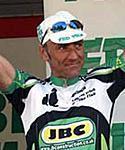
Recently on Cyclingnews.com |
An interview with Malcolm Elliot
Only as young as you feel
It was 1982 in Brisbane, Australia. A 21 year-old from Yorkshire, England, with blonde locks and a killer sprint burst onto the international cycling scene, winning the gold medal in the Commonwealth Games road race and providing a launch pad for a hugely successful, 14 year career in Europe and the US. 21 years on, he still has his fair hair and mighty motor, and won't stop until he says so. Anthony Tan speaks to the phenomenon that is Malcolm Elliot.
ENGLAND AND EUROPE HAVEN'T HAD A SUMMER LIKE THIS FOR MORE THAN 40 YEARS. Temperatures in London are regularly in the mid to high 30s, and in Paris, the elderly are literally dropping like flies, with hospitals unable to cope with the heatwave that has enveloped the city and is devouring the residents for breakfast, lunch and dinner.
But Malcolm Elliot is a happy man.
"I was just looking out the window this morning, looking at the bright, blue sky, thinking: 'Yeah, I've got to go and ride my bike today'", he says with the insouciance of a Byron Bay* surfer on the dole queue.
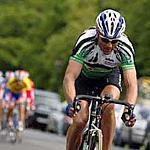 |
After thirteen and a half years as a professional cyclist, Malcolm Elliot could certainly afford to sit on his backside after astutely investing in several properties during his heyday as Britain's most successful road sprinter. In fact, after his forced retirement in 1997 as result of the demise of a US-based road team, Comptel Data Systems, he chose to do exactly that.
"I did some work in the building trade and on my own investment properties, but really, I just did a bit of travelling and kind of relaxed a lot and potted around," says Elliot. "I'd go out for a long ride, and then do nothing again for six months. In fact, during those five years, there was a period of over a year where I didn't even ride my bike."
Then again, he didn't really need to. Overall and multiple stage winner of the Kellogg's Tour of Britain, Milk Race and Nissan International Classic, winner of the Herald Sun Tour in Australia, third in Amstel Gold, British road champion, winner of the points competition in the Tour of Spain, and a leading force on the US domestic road scene in the early to mid 90s. During that time, Elliot rode for some big name European teams, including Fagor, Teka and Seur, but at the end of 1992, he wanted a 'change of scenery', so off he went to the States to spend the next four years riding for Chevrolet.
"I think that was quite a surprise for everyone. But there were complaints in the press about how I'd been given a ride based on who I was" |
"With Teka, Seur and Fagor, pressure was always a big factor - you were very well paid, but the pressure that came with that was not easy to bear," remembers Elliot. His tale of woe was far from uncommon in what seemed to be a regular occurrence among the few English-speaking cyclists riding in Europe in the era of Hinault, Fignon and Lemond.
After four memorable years at Chevrolet, Elliot joined the Comptel Data Systems team, but from the beginning, things didn't feel quite right. "At Chevrolet, it was great fun and the team had a great spirit, but that never eventuated at Comptel; we never got that atmosphere," says Elliot. "Then in July, the team announced they 'had a temporary cashflow problem' - which subsequently became permanent. So from July to November, I gradually realised that I probably wasn't going to continue, and there were not a lot of other options at the time."
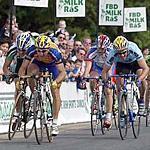 |
With riders continuing to race for no money, the situation sounded disturbingly similar to the internal combustion of the Linda McCartney cycling team not so long ago. Despite such a traumatic experience, however, Elliot's mind, like so many cyclists, has blanked out much of the mental turmoil.
Says Elliot half-jokingly, "I think the mind erases these bad experiences from your memory, because if you did remember them, you wouldn't be riding a bike."
Compared to the uncertainty of Comptel or frost-bite at the 1989 Vuelta (Elliot tells me there were times in the mountains where he was so cold, he thought he was going to die), a return to racing was relatively painless and without complication.
"Come to think of it, it wasn't really that difficult," says Elliot, sounding almost a little puzzled himself. "I just enjoyed going for long rides, getting to bed early and doing another long ride the next day. We had good weather in February and March, so that was big help, but throwing a leg over my bike every day was enjoyable."
But after five years of total obscurity, why?
Elliot hesitates, trying to find a deeper explanation for his comeback to the sport, but in the end, there isn't one. "I think it was to see if I could do it," he says simply.
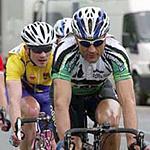 |
"Initially, my plan was just to get fit enough to be able to do the Masters' races, and I was thinking about the national Master's Championships at the time, thinking it would be nice to go to that. But I just missed the cycling scene and being part of it. I had nothing to do with it at all during those last five years, and I needed to have it as part of my life again."
When the South Yorkshire lad rocked up to his first Premier Calendar race, it was almost as if he had never left. "Actually, nobody really said much at all," he laughs. However, the local press had plenty to say when he surprised everyone except himself and finished third: "Immediately following that, there were complaints in the press about how I'd been given a ride based on who I was," says Elliot in a tone of disgust.
"I think my reputation sort of preceded me, and in my first couple of races, I was followed everywhere."
He later tells me that what has made his job most difficult is not the endless of hours of training, but having to ride as an individual rather than as part of a team. After being handed a bike and clothes by friend Phil Griffiths, his former team manager at ANC Halfords and now an importer of Pinarello bicycles, Elliot is a one-man band. "I've got to make sure I'm in the right moves all the time; if I miss the break, then I'm in trouble," says Elliot about his simple but exhaustive race strategy.
Other stuff
|
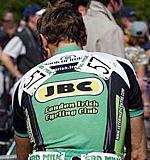 |
With one race remaining, Elliot is more than likely to finish third overall on the Premier Calendar rankings - not bad for a guy who only decided to start training seriously in February this year. But sprinters are hungry riders: Elliot speaks of his comeback not so much as a return, but a fresh start to an unfinished career. "I had six years out of the sport - which is a long time away - so I'm treating this year as a fresh start to the sport and trying not to make too many comparisons," he says.
Elliot also believes there is plenty of scope for improvement, and from what he's just told me (he's off to the US early next month to 'investigate some possibilities'), so do a number of other teams.
"I've got a couple of options right now, one of which involves riding some smaller events in Europe and around the world. Another possibility is doing a [race] program both here and in the States, and I'll be investigating those opportunities in the next few weeks," he says cautiously, careful not to give too much away.
Whatever road Elliot chooses, one wonders how long this effervescent 42 year-old can keep going on for, and what is there left in the sport that he hasn't already achieved.
"How long I can keep going is not easy to predict," admits Elliot. "I'll just take it year by year, but I'd like to think I can certainly be competitive next year and probably the year after. But really, just to keep winning races and showing the younger guys how to do it. And when I do finally decide to stop, I want it to be on my terms; and when I do stop, I want to be involved, not slip into the shadows again."
*Byron Bay is a beachside town on the east coast of Australia, well-known for its large population of unemployed hippies and surfers.

